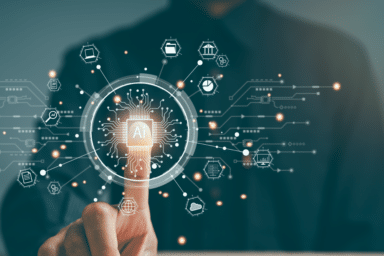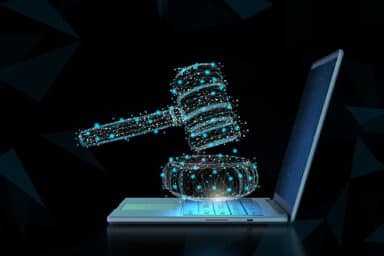Will AI Replace Paralegals and Legal Assistants?
By Catherine Brock
Apr 30, 2024
| 11 min read
AI is early in its lifecycle, but the technology is already a powerful resource for legal professionals. ChatGPT and related AI tools can write, edit, and research—three tasks that weigh heavily on the daily agendas for paralegals and legal assistants. If ChatGPT can handle those duties, law firm administrators will likely ask their support team members to take on higher-level responsibilities.
Let’s explore the merits of AI in the legal field and how they could affect the work paralegals and legal assistants do today. We’ll cover what AI can and can’t do, and share how paralegals and legal assistants can add value in an AI-enabled world.
What Are the Roles of Paralegals and Legal Assistants?
Paralegals and legal assistants are key members of a lawyer’s support team. Their work frees up lawyers to focus on case strategy. Below are the specifics of each role.
Paralegals
Paralegals spend the bulk of their time on legal or case-related tasks, such as:
- Conducting legal research and discovery: Paralegals access databases and books to identify and document regulations and precedents that apply to a specific case.
- Performing client interviews and communication: Paralegals usually remain in close contact with clients, gathering information the lawyer needs or sharing case updates.
- Drafting legal documents: Paralegals draft documents as needed, from correspondence with witnesses to pleadings and briefs.
- Managing document databases: Paralegals may be responsible for maintaining a clear, functional system of organization for the firm’s templates, contracts, and other critical documents.
- Summarizing depositions: Paralegals will translate dense depositions into concise overviews that include key facts, plus any admissions or inconsistencies in the testimony.
- Supporting investigations: Paralegals may interview experts, gather evidence, and perform other research and investigative tasks as needed.
- Conducting witness interviews and testimony prep: Paralegals will often manage the witnesses leading up to the trial. They may work closely with witnesses to review the key points of the case and practice testimony.
- Managing case files: Paralegals manage the case file, ensuring that every relevant piece of information is properly named and filed.
Legal Assistants
Legal assistants also support case-related tasks, but they are primarily dedicated to administrative work. Specific tasks can include:
- Providing client service: Legal assistants may be the first point of contact for prospective and existing clients. They may be responsible for answering questions about client accounts and billing via phone, email, or secure messaging.
- Organizing legal documents: Legal assistants support the paralegal in keeping documents organized and easily retrievable.
- Assisting with drafting and proofreading legal documents: Legal assistants may be tasked with proofing contracts, briefs, etc., or drafting portions of them.
- Prepping and filing legal documents: Legal assistants may prepare certain court paperwork under supervision. They can also file documents with the county clerk.
- Assisting with legal research and evidence collection: Legal assistants often support paralegals in accessing legal databases for research and gathering relevant case details from witnesses and experts.
- Managing calendars: Legal assistants have full view of the legal team’s calendars across cases. They communicate deadlines and schedule commitments according to availability and case timelines.
- Managing client billing and accounting: Legal assistants often oversee the billing and payments process by preparing invoices and responding to billing-related questions.
How Is AI Currently Impacting Legal Professions?
AI is changing daily workflows for paralegals, legal assistants, and lawyers. Increasingly, law firms are adopting AI to streamline time-intensive tasks, such as:
- Document review: AI applications can scan multiple documents to identify themes and commonalities.
- Contract analysis: AI can analyze contracts to highlight key points and risk factors.
- Legal research: ChatGPT and lawyer-specific tools like Paralegal AI can streamline legal research by scanning massive amounts of online data to identify relevant cases and statutes.
- Document drafting: AI can create quick drafts of contracts, briefs, client correspondence, and more.
- Document editing: AI can review existing documents for typos, inconsistencies in verb tense, unclear wording, citation formatting, etc.
Those tasks clearly overlap with the responsibilities of paralegals and legal assistants, particularly in the areas of summarizing, researching, and drafting documents. However, direct comparisons of AI functionality to paralegal or legal assistant job specs don’t tell the full story.
That full story has an interesting twist. Although AI has robust capabilities, its outputs are not usable without human intervention. ChatGPT, the most recognized AI tool, is notoriously prone to sharing made-up or inaccurate information.
Will AI Replace Paralegals and Legal Assistants?
No, AI will not replace paralegals and legal assistants—at least not in the foreseeable future. The legal professionals who are using AI successfully are coupling quick AI-produced answers with human oversight and review. And, they’re using paralegals and legal assistants to deliver that oversight.
So while the proliferation of legal AI tools is among the major trends in the paralegal profession right now, the outcomes will be subtle. Paralegals and assistants can expect their jobs to evolve—not disappear—as AI adoption grows. It’s possible AI will make these support jobs more interesting and more necessary. Paralegals and legal assistants will likely have fewer rote tasks on their daily calendars, but increased responsibilities around reviewing and analyzing AI outputs.
To understand more clearly how that job shift might play out, let’s review what AI can and can’t do.
How Law Firms Can Leverage AI
AI software for lawyers excels at language-related tasks. ChatGPT, for example, can read, write, edit, analyze, and summarize words faster than a human can. Likewise, Paralegal AI can comb through case information online and provide a summary of research in response to a prompt.
Law firms can leverage those language skills to create drafts that are handed off to the support team to finish. The draft might be a document, a list of suggested edits to a contract, a summary of relevant case law, or a prediction on case outcome. The paralegal or assistant can use these drafts as resources that contribute to a final document, analysis, or case strategy recommendation.
Note that AI outputs can contribute in different ways, too. The obvious contribution is a drafted output that a paralegal edits and finalizes. But AI outputs won’t always be precursors to final documents. They can also function as conversation starters that prompt new ideas or team brainstorming sessions about the case.
Tasks AI Cannot Handle For Law Firms
AI cannot take over the client management and interaction responsibilities of the legal support team.The technology’s excellent language skills don’t translate well into people skills. A chatbot cannot engender trust or sense worry. AI cannot gauge when to reassure clients or delve deeper in witness interviews.
For that reason, interpersonal interactions with clients, witnesses, and team members are best handled by experienced legal professionals. Even tasking a chatbot to answer seemingly straightforward client questions can be problematic. AI tools have trained-in biases that can be inadvertently offensive or deliver poor user experiences.
AI also lacks any contextual knowledge and higher reasoning capacity, two essential skills for paralegals and legal assistants. Cases with varying degrees of complexity can be affected by nuances which are generally overlooked by AI tools. Examples include a client’s wishes or subtle semantics that define the intent of a statute.
Paralegals and legal assistants, on the other hand, are trained in complex critical thinking and analysis. It’s unlikely that AI will ever catch up to the legal professional’s skill in this area.
Expert Opinions on the Future of the Paralegal Profession
Experts largely agree that AI can augment legal support roles, but not replace them. As well, many agree that AI and generative AI adoption may shift job responsibilities and change hiring criteria for law firms. It’s likely that AI-enabled law firms will seek out candidates who excel at people skills and understand the best practices of using AI.
“As AI reduces repetitive tasks, paralegal job responsibilities will shift, ultimately impacting hiring priorities and criteria for law firms. The paralegal role will evolve to emphasize analytical skills, and law firms may begin to prioritize technological fluency with AI tools over traditional legal skills when hiring paralegals. Firms will be able to maintain smaller, more nimble teams, which ultimately could limit routine hires as a matter of course. Instead, firm leaders may focus on filling paralegal roles that bridge the gap between traditional law firms and technology-driven law practices.” – Niki Black, Attorney, Author, and Legal Technology Expert
“AI is transforming the legal industry, including the duties currently tasked to paralegals. Embracing AI and training to use these tools to automate administrative, routine tasks will allow us to reduce the time we spend on manual data entry and analysis, client intake, and document management. AI will better equip us to support our attorneys. I would not be surprised if the role of the paralegal expands, as AI makes the entire team faster and more productive.” – Cheryl Ischy, 30+-year Paralegal
Embracing the AI Revolution
Paralegals and legal assistants can and should take steps to increase their workplace value in an AI-powered world. Increasingly, law firms will ask team members to use AI for efficiency’s sake. Those who embrace and adapt to the technology will enjoy greater career opportunities vs. those who don’t. Below are five ways paralegals and legal assistants can prepare themselves for the future of AI and law.
Upskill AI and Legal Tech Skills
Paralegals and legal assistants who utilize ChatGPT at work must learn the nuances of effective prompt writing. They must also know how to evaluate the bot’s outputs carefully. That can involve finding a single typo in a 40-page document or recognizing mistaken logic that skews an entire analysis.
Beyond ChatGPT, there will be more AI-powered tools available for law firms in the coming months and years. Paralegals and legal assistants can position themselves as AI savvy by monitoring legal technology news to stay updated on the latest artificial intelligence innovations.
Understand the Ins and Outs of AI Limitations
Lawyers Steven Schwartz and Peter LoDuca learned the limitations of AI the hard way. The two presented a ChatGPT-produced legal brief to courts that cited fictitious cases. They claimed ignorance, saying they didn’t know the chatbot could fabricate information.
Deep knowledge of AI’s limitations is a requirement to using these tools effectively. Paralegals and legal assistants who have that knowledge will become more valuable professionally as AI adoption grows.
Strengthen Soft Skills
Legal issues are sensitive matters to the people involved. Whether the case involves a divorce or a workplace injury, a skilled legal professional can detect emotional triggers early on, then navigate around them in client interviews, conversations, and case strategy. AI cannot detect those sensitivities or effectively incorporate them into the case strategy.
For that reason, legal professionals who demonstrate nuanced interpersonal skills will stand out in the modern law firm. Those who spend time developing their competence in communication, solving problems, collaborating, thinking critically, and managing conflicts will likely see more opportunity going forward.
Strengthen Skills for Complex Tasks
Greater use of AI will add higher-level tasks to the daily responsibilities of paralegals and legal assistants. These support team members may do more analysis and get more heavily involved in brainstorming sessions and strategy conversations. Those who welcome the change will thrive.
Stay Educated and Invest in Continuous Learning
Online learning platforms like Udemy have a range of low-cost courses covering AI and its applicability to the legal field. Paralegals and legal assistants can also make use of local conferences and software demos to stay current on the latest in AI innovations.
Stay Equipped for the Age of AI
AI won’t replace paralegals and legal assistants, but it will affect their job responsibilities. Those who lean into the change will enjoy more career opportunities, not less. Key steps to remain relevant as a legal support team member include learning the capabilities and risks of AI, staying abreast of legal AI innovations, and advancing interpersonal and critical-thinking skills.
Case management software MyCase combines automation and AI features to help law firms get the most from their teams. Paralegals and legal assistants can navigate case files effortlessly, edit and summarize documents in a flash, create accurate invoices seamlessly, and engage with clients securely.
With MyCase, you can leverage AI in your practice safely and securely with a full-featured case management solution. To learn how MyCase can help your firm maximize every minute, reduce costs, and improve client service, schedule a demo today.





